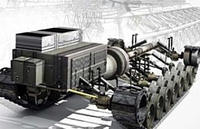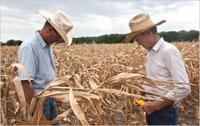-
DOE addresses rare earth, critical materials shortage
The U.S. Department of Energy announced earlier this month that a team led by Ames Laboratory in Ames, Iowa, has been selected for an award of up to $120 million over five years to establish an Energy Innovation Hub which will develop solutions to the domestic shortages of rare earth metals and other materials critical for U.S. energy security.
-
-
New approach to military manufacturing

In the past, fighter aircraft, tanks, and other complex military systems have been built in a craftsman-like process by a small number of highly specialized contractors. This is a costly approach and DARPA is attempting to replace it with a more efficient “correct by construction” process similar to that practiced by the semiconductor industry, which has an impressive track record in getting systems right in the first place.
-
-
Five people injured as guns go off at gun shows

“Gun Appreciation Day” rallies were held in cities around the country this weekend, and gun shows were doing brisk business; five people were injured as guns went off accidentally in three such shows.
-
-
Global demand for food and energy is growing, and so does land and water “grabbing”

As world food and energy demands grow, nations and some corporations increasingly are looking to acquire quality agricultural land for food production. Some nations are gaining land by buying up property — and accompanying water resources — in other, generally less wealthy countries.
-
-
Privately run detention center locks up immigrants for months

Hundreds of immigrants who have committed minor offenses have been locked up for weeks or months at a time in a Broward County, Florida facility run by a private company. The majority of the immigrants have been accused of entering the country illegally or staying longer than were allowed to.
-
-
Tires shipped from Arizona to a U.K. contained black widow spiders

Two shipments of tires from an Arizona company to a U.K.-based client contained dozens of deadly Black Widow spiders; it appears that the spiders nested in the tires in Arizona, and hatched a brood of young spiders while the shipment was on its 5,000-mile journey to England.
-
-
Military systems hibernate on the sea floor, then woken up remotely
Almost half of the world’s oceans are more than four kilometers deep. This provides considerable opportunity for cheap stealth, but the vastness and depth make retrieval costs prohibitive. DARPA wants to developing deployable, unmanned, distributed systems which hibernate on the deep-ocean floor in special containers for years at a time. These deep-sea nodes would then be woken up remotely when needed and recalled to the surface
-
-
DARPA’s first FANG Challenge begun yesterday

More than 700 participants, organized in 150 teams, yesterday begun collaboration to design the mobility and drivetrain systems of a next-generation, amphibious infantry fighting vehicle. The goal of the competition is to compress the design-to-production time of a complex defense system by up to a factor of five.
-
-
Global warming threatens U.K. diet
The number of days with temperatures over 32 degrees C has more than doubled in some parts of France over the last fifty years. Many other land areas show similar increases. By the 2020s, temperatures over 32 degrees C could occur over large areas of France where previously they were uncommon. Maize yields are reduced significantly for each day with temperatures over around 32 degrees Celsius. The United Kingdom imports more maize from France than anywhere else in the world, and declining crop yields in France mean that U.K. consumers will have to pay more for maize-based foods, or change their diets.
-
-
Drought, heat turn hundreds of U.S. counties into disaster areas

The U.S. Agriculture Department (USDA) last week said that drought conditions and heat necessitated designating 597 counties in fourteen states as primary natural disaster areas. The affected counties have suffered severe drought for eight consecutive weeks, which qualified them for the automatic designation. 2012 had been the hottest year on record for the continental United States: the year’s average temperature of 55.3 degrees Fahrenheit across the Lower 48, which was more than 3.2 degrees warmer than the average for the twentieth century.
-
-
DHS: Industrial control systems subject to 200 attacks in 2012
A DHS report released last week revealed that industrial control systems, which are used to monitor and control critical infrastructure facilities, were hit with 198 documented cyberattacks in 2012, and that many of these attacks were serious.
-
-
Neutralizing the effects of lethal chemical agents
Organophosphorus agents (OPs) are used both in farm pesticides, and by terrorists and rogue states. About 200,000 people die each year across the world from organophosphorus agents (OP) poisoning, through occupational exposure, unintentional use, and misuse, mostly in developing countries like India, Pakistan, and Sri Lanka and through deliberate terrorist activities. OPs include compounds like Tabun, which was developed in 1936 by German scientists during the Second World War, Sarin, Soman, Cyclosarin, VX, and VR. Researchers develop an enzyme treatment which could neutralize the effects of OPs.
-
-
U.K. revises nuke emergency plans post-Fukushima
The Sizewell nuclear power station in Suffolk, England, was decommissioned in 2006, but after the 2011 Fukushima disaster, the Suffolk authorities thought there was a need to upgrade the emergency plans for the people living around the plant. There are disagreements, however, over the radius of the emergency zone around the plant, and how many people should be included i evacuation plans and given potassium iodide tablets in the event of a radiation leak.
-
-
Catching up: Indian and Chinese companies at the forefront of innovation
In a few short years, the Chinese and Indian share of the world’s research and development centers has increased from 8 to 18 percent. A new study says that India and China invest more than the West in organizational innovation, that is, the implementation of a company structure that creates a favorable climate for new inventions.
-
-
Instant DNA analysis worries privacy advocates
In the past, it took weeks to analyze a person’s DNA, but with new technology it can take less than a day, and in most cases less than two hours; Rapid DNA analyzers can process a DN sample in less than ninety minutes; these machines, the size of a household printer, are now being marketed to local, state, and federal law enforcement agencies around the country; privacy advocates worry
-
More headlines
The long view
Factories First: Winning the Drone War Before It Starts
Wars are won by factories before they are won on the battlefield,Martin C. Feldmann writes, noting that the United States lacks the manufacturing depth for the coming drone age. Rectifying this situation “will take far more than procurement tweaks,” Feldmann writes. “It demands a national-level, wartime-scale industrial mobilization.”
Trump Is Fast-Tracking New Coal Mines — Even When They Don’t Make Economic Sense
In Appalachian Tennessee, mines shut down and couldn’t pay their debts. Now a new one is opening under the guise of an “energy emergency.”
Smaller Nuclear Reactors Spark Renewed Interest in a Once-Shunned Energy Source
In the past two years, half the states have taken action to promote nuclear power, from creating nuclear task forces to integrating nuclear into long-term energy plans.
